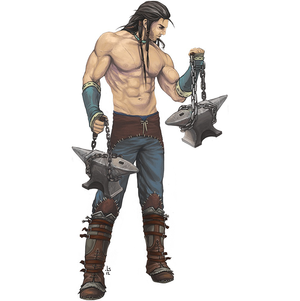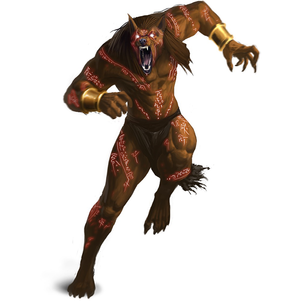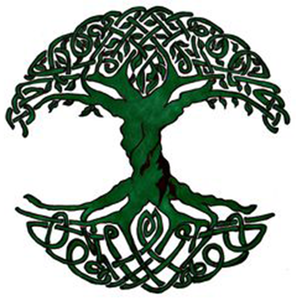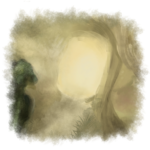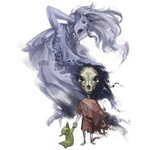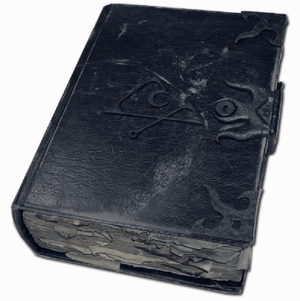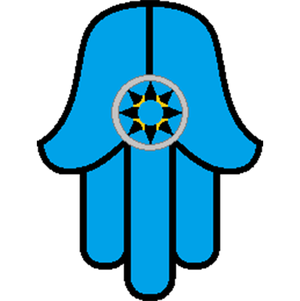New Organizations
Welcome to the homepage of our brand new organizations! If you want to make an organization, take a look at our questionairre. Organizations may remain here for up to a year, at the discretion of staff.
| Adventuring Organizations | |||||||||
| These organizations focus on the hunt, conversion, or eradication of different types of creatures. | |||||||||
| |||||||||
| RPP-Related Skills: Knowledges appropriate to creature type, Sense Motive, Bluff, Survival, Perception | |||||||||
| Hunter Organizations | |||||||||
| These organizations focus on the hunt, conversion, or eradication of different types of creatures. | |||||||||
| |||||||||
| RPP-Related Skills: Knowledges appropriate to creature type, Sense Motive, Bluff, Survival, Perception | |||||||||
Be Right Back
Adventuring
| Common: Elunite, Vardaman, Inquisitors, Bards, Wizards (abjurers), Rogues, Clerics Locations: Near Elunan Temples | |
| Recovery and destruction of dangerous artifacts; a safeguard against artifice's and mana's overreach | |
| The Acquisitioners specialize in the hunting down and attainment of dangerous items of a magical nature at the behest of the Temple of Eluna! Aside from collection, they see themselves as balancing force against the mages who create such monstrosities. They work hard to acquire and seal these items safely away, or destroy them when required. They as part of their trade, they do their best to monitor known evil casters, and take action to prevent them from causing harm if they can. They possess a reputation for both zeal and responsibility in their duties.
Sir Chorin Deglauss formed the Acquisitioners in his younger years. Based on his Elunan ideals, he formed the original group from a group of his friends. Ragtag idealists all, they were nonetheless shaped by his brilliant mind, and made it their mission to recover artifacts--of the dangerous sort. Though they ran into trouble soon after and Chorin was slain by an artifact's power, his legacy lives on, as does tales of his dashing heroism.
The Acquisitioners operate worldwide. They operate under the auspices of the Temple of Eluna and are led by a council of three Elunites and one Vardaman, who answer to the greater Temple structure. These leaders are typically chosen among the clergy, though there is usually one with inquisitor's training. The Acquisitioners work with varied temples and magical societies. Among these groups, they tend to possess a mixed welcome; some mage groups, for example, could argue the preservation of dangerous artifacts for research purposes, while the acquisitioners may be called in to dispose of it safely. Their greatest allies are among the Elunan temples. While not a secret group, they also do not tend to advertise the scope of their membership. While many members are inquisitors, their dangerous tasks require a diverse membership. Among their number are catalogers and researchers. There are even members who negotiate their entry into politically sensitive areas (with mixed degrees of success), while others work to keep an eye on known crafters. And of course, the mage killers. Overall, the organization supports a wide variety of necessary roles. Their purpose, and means of their founding gives them a certain zeal--they possess a reputation of fearlessness on the job and a drive towards "getting the task done by the Light," as well as respect for what they see as the Founder's Ideals, which different members may interpret differently. Of course.
| |
| RPP-Related Skills: Perception, Survival, Knowledge/History, Knowledge/Arcana, Knowledge/Geography, Disable Device, Spellcraft, Craft/Artifice | |
NPC
| Common: All Locations: Alexandria (A02) | |
| The local paper, comprised of reporters and heroes who'll do anything, brave anything, to get the scoop! | |
| Alexandria's local paper! A mixture of shining journalism and ragtag rumor. Reporters, journalists and rumormongers abound. The Tribune has its offices in Lower Alexandria. You do not need to be a member of this organization to publish in it--player and character submissions are all accepted. | |
| RPP-Related Skills: Forthcoming... |
Militant Groups
| Common: Cavaliers, Paladins, Fighters Locations: Happy Valley, Alexandros | |
| Despite Happy Valley's success through both its silver mines and its members creative (and determined) use of those mines, it too has faced the rocky sea of a changed world. Within the Valley, there are some that are not happy with the reliance on outside factors to protect themselves. | |
| History
Renard Torchwhistle, an older gnomish gentleman, veteran of the Sendor war, and proud resident of the Valley, saw an opportunity and a cause. Inspired by the cavalier movement sweeping Alexandria and true to gnomish fashion--he gathered a group of like-minded gnomes. Together, they have adapted this tradition towards their own goals.
Renard is a crusty old gnome who was wounded in some of the most brutal fighting of the Sendor war and for whom any tactic or strategy is a valid choice in the defense of his people. He is best recognized for his long thin mustache and exaggerated, traditionally gnomish accent. Although, a good portion of people, gnomes included, think of him as a has-been hero whose too paranoid and just wants to relive his glory days, he is nonetheless capable...just crusty. And, the elders whisper, lacking a true Rival for his efforts. The Knights themselves are a loose militia, formed of individuals of all walks of life in the Valley. Although they number only in the few dozen, these knights-in-the-making have come together in an effort to defend their home and what they view as gnomish values--of creativity, determination, and dedication! Likewise, Renard has recognized that the safety of the valley is closely based on the protection of Alexandria. The organization encourages its younger members to join with Alexandrian guilds not only for practice but as a way to actively fight the evil that might threaten the Valley. Thus, the Knights were born. Meetings often take place in barns, living rooms or homes. At the moment, there is no formal structure or really any money available to the Knights other than what they bring. In fact, most of its members are equipped with the tools of their professions that they have shaped into weapons. The more serious members though often invest in some armor and proper weapons; a thief would fare poorly trying to steal from their residence! Their hodge-podge nature has however, developed some truly 'interesteng' talents among them--ones that would not be expected within a normal knights' organization. The primary purpose of the Knights of Happy Valley are to fight for justice and freedom for all gnomekind, especially those of Happy Valley. Although any citizen of Happy Valley, not just gnomes would fall under their protection. Woe to any who would insult Happy Valley around one of the knights, they just might find out just how far a fierce and determined gnome can shove a shoe up their backside. To be a member one simply has to be from the Valley, all skills and talent levels are accepted. A patriotic love of Happy Valley is the only requirement.
RPP-Related Skills: Knowledge/nobility, Diplomacy, Knowledge/Local, Knowledge/Military Theory, Knowledge/Geography, Perform/Dance, Perform/Oratory | |
| Common: Cavaliers, fighters, swashbucklers, paladins Locations: Alexandria, Myrddion | |
| An order dedicated to the ideals, memory, (and hopeful recovery) of Myrddion's missing king. | |
| The Knights of the Lost Crown are a group of knights and honorable warriors dedicated to the ideals and service of the missing king. Some of them joined for other reasons--the notion of preserving Myrrish honor, and the honor of ancient traditions. | |
| RPP-Related Skills: Diplomacy, Knowledge/nobility, Knowledge/history, Knowledge/Military Theory, Athletics, Ride, Profession/Stablehand, Handle Animal, Perform/dance, Perform/sing | |
| Common: Angorite, Korite, Fighter, Barbarian, Cleric, Cavalier, Swashbuckler Locations: Many cultures | |
| An order to contests of strength, the Mountain, and celebration of heroic acts. | |
| This order consists of soldiers, barbarians and clerics devoted to the tenants of Angoron. Locally, the Order are Angoron's representatives in the Colosseum District in Alexandria, though they are known in many nations. Their warriors often act as part-time mercenaries who operate in different areas of the world and are renowned for their tenacity and prowess in battle. Aside from their own abilities, however, the order's greatest work revolves around showcasing Aragorn's work. The Order Paramount are renowned organizers of sporting and athletic competitions, which often draw huge crowds. These events are complex tasks, from organizing local medical care of the athletes, to the right kind of promotion--and beer drinking after. | |
| RPP-Related Skills: Intimidate, Craft/Weaponsmithing, Craft/Leatherworking, Knowledge/Military Theory, Acrobatics, Perform/Oratory, Athletics | |
| Common: Cavaliers, fighters, swashbucklers, inquisitors, paladins Locations: Alexandria | |
| An order dedicated to adventure, and the preservation of noble ideals. | |
| The SGA is a formal organization that was formed by a group of individuals of modest influence, who are concerned with the current and future members of the Guild of Adventurers and other Alexandrian-based groups. The society's purpose, its clean uniform at social events and its leadership's pride in "noble acts," has led some to believe its members are all stuffy and uptight, far too concerned with appearance over actual substance. They often talk the talk but don't always walk the walk, it is said. Others however, appreciate what the organization is striving towards.
Members are also expected to model citizens and be paragons of virtue. Adventurers that appear to conduct themselves to a more noble standard are often approached to be members, as they feel they would make good members of the Society. While an impossible goal to achieve its pursuit is considered of paramount importance.
The Society is led by the Council of Five, mostly seasoned, former adventurers, knights and minor nobles--usually the sons and daughters of sons and daughters, who had possessed both drive and reason to be either ambitious, or remember the old days fondly. Their primary concern is the social impact, virtue and bearing of the Adventurers that represent Alexandria and those who have influence on the culture and youth of the city. At the head of the Five is an older gentleman known for his gruffness and rude temper--a temper bound (though barely) by the behavior the society expects.
Society activities often include debates on the important social issues, workshops on self improvement and debates often on topics related to morality and other complicated issues such as these. Though there is far less consensus than one might expect. A reoccurring subject is debate on practical action versus virtuous action. What is more important? The singular or greater good? Debates are lively to say the least, though it is easy to get them to 'organize' behind a Goodly Cause, and though this unity may not last for long, it can be striking, and cement lasting friendships, besides. Of course membership also has its perks, since most of its leaders had 'lived the life' at one point or other, among the adventuring community--or had come from a more noble though modest background, being the son of a third son, and so on. (This difference in backgrounds is the source of some strife within the organization, though as more of an undercurrent than something that divides it in two.) Its members are expected to conduct themselves accordingly, regardless of income. As such private ballrooms, catering and other such services are often made available to its members to ensure any events thrown are of an appropriate caliber. In addition members have access to a number of expert stylist and tailors to ensure their outward appearance is appropriate for a person of noble bearing. This includes access to the latest fashion and technology for the dashing knight on the go. One of its strengths is the reach of its social network, among houses willing to listen. Though most of its council are not high up in rank, they can put an ear out, to those still willing to bend an ear to Justice. It does not guarantee a response--and association with the Society may be considered at times, an anacronism or even embarrassment, but such words stand a chance of being heard. | |
| RPP-Related Skills: Knowledge/Nobility, Knowledge/Military Theory, Knowledge/Religion, Perform/Oratory, Perform/Dance, Diplomacy, Knowledge/Local | |
| Common: Korite, Fighter, Swashbuckler, Barbarian, Cavalier, Inquisitor, Cleric Locations: Kor-focused cultures | |
| An organization focused on the study and exploitation of war tactics and strategies, for the purpose of war. | |
| Formidable Soldier-Saints of Kor, locally the Battleguard are Kor's representatives in the Colosseum District in Alexandria, though they are known in many nations. Many are are clergy members and soldiers who specialize in every aspect of military affairs. Specializing in training, battle tactics and strategies they are often called on by the military forces of various nations who seek their expertise. Battle Rousers and Champions they seek to inspire those beneath them to epic feats of combat and warfare and they are often exacting task masters and drill sergeants in their attempt to forge a given company of soldiers into the ultimate fighting force. Battleguards often emerge from The Proving Grounds in Dran and spread their efforts all across the continent. Needless to say, they are welcome in times of war, though they're infamous for their lack of loyalty to any particular side outside of it. | |
| RPP-Related Skills: K/military theory, Profession/Soldier, Intimidate ...other? |
| Common: Korite, Monk, Fighter, Cleric, Inquisitor, Barbarian, Cavalier Locations: Alexandros, Dran, etc. | |
| A monastic order. | |
| Template:OrderBrothersWar | |
| RPP-Related Skills: Forthcoming... |
| Common: Angorite, Monk, Fighter, Cleric, Bard, Swashbuckler, Inquisitor, Tarienite Locations: Alexandros, Dran, etc. | |
| A monastic order dedicated to the ideals of the Mountain! | |
| Angoron's Order is a group of primarily LG monks dedicated to physical perfection. A jovial lot, they defy the stereotype of the 'stuffy monk' and can be found among most cities. The order spars for sport, for self-perfection, and as a nod to Tarien's friendship to Angoron, for entertainment. Among them are some of the greatest storytellers of Ea, for a skillfully woven tale is an honor to the Mountainbringer. Their strict code of honor prevents them from using dirty tricks, though they are quite talented at finding an advantage. They believe in the Ultimate Good, and they believe in fighting with what Angoran provides, which starts with the strength of the body. Long hours of physical and mental focus do not need to be dull and quiet and boring. They just have to be long. | |
| RPP-Related Skills: Forthcoming... |
| Common: Daeusites, Paladins, Clerics, Monks, Inquisitors Locations: Alexandros | |
| A group dedicated to bringing justice to those whom it was taken from, and to cleansing the world of Taara's abberations. | |
| When the King of Myrddion vanished into the Mists, the Templars of the Holy Sword flooded Alexandria in their search. However, no king was found and over time, the Templars disbanded and returned to Myrddion to resume their guarded vigil of that nation's oldest relic.
Yet, their presence served as an inspiration to those who would make a difference in a new and frightening world. Saved as it was from the devastation, some in Alexandria felt they owed it to the world to bring justice to those who had suffered. These Alexandrians found aid in two former Templars, who wished to take a more active role in the world. Since then, a small but promising order has sprung up. It is dedicated to bringing justice to those whom it was taken from, and to cleansing or redemption of the world of Taara's abberations--that is, the beasts, people, and creatures who were warped by her magic. This is slightly different than the greater Temple's strikes against demons and devils; their focus is more on Ea itself and the lives within. They see abberations as the warping of Ea's life by evil's hand, for example. Primarily a militant group, the Radiant Sun also has its followers among the monastic and clerical. The Radiant Sun draw their strength from the original Templars, but are a new, and forward-moving organization. They are small, however and struggling. Their leaders, once united are now at quiet war, ironically, mirroring the cold war even now brewing in Myrddion. What the cause of it isn't certain, but it has had subtle effect on things. | |
| RPP-Related Skills: Forthcoming... |
| Common: Rangers, Cavaliers Locations: Alexandria (A17) | |
| Inspired by the Myrrish tradition, these griffon-riders guard Alexandria and her airship trade. | |
| A pillar of Alexandrian Strength for the last century, the Skyguild owns and operates the majority of artifice-driven Airships that fly the skylanes, bringing trade and passengers to Alexandria from distant lands. The Skyguild is divided into three main branches: The Department of Trade and Mercantile Relations, The Operations and Services Division and the Skyguard.
The Trade and Relations Division manages the Skyguild. It establishes the regulations and levees fees for freight and passengers that travel on their ships. Additionally, the TRD manages overall guild finances and operates offices at any city in which the Skyguild's ships regularly stop. The Operations and Services Division supports all aerial operations, providing the mechanics and craftsmen responsible for building and maintaining these marvels of the modern day. The OSD also provides engineers and crew for the ships themselves, and manage the vast majority of the Skyguild's employees. Seasoned workers also are selected to train new personnel under the OSD's juristiction. Finally, there at the Skyguard. The Skyguard take their name from the Myrrish tradition, and trace their origins to the Myrrish occupation of Alexandria. Not all of them are griffon-riders, however, though the image is iconic. The Skyguard operate both Skyship security for trade and passenger ships, as well as operate Alexandria's aerial warships in conjunction with Alexandrian Army personnel. The Skyguard's few ships fly as escorts for convoys of trade ships, or particularly valuable cargo and passenger flights. | |
| RPP-Related Skills: Forthcoming |
Artistic
| Common: Bards, Sorcerers, Rogues Locations: Alexandria (A04) | |
| Located in the artistic heart of the City, Alexandria's Bardic College is world-reknowned. | |
| Alexandria's Bardic College is centered in the Theatre District, among its sundry and noted theatres and performance halls. It is noted for the "Midnight Run" tradition, where seniors run through campus, painting murals and new colors on the buildings every year. Other acts of artistic merit, such as a midnight concert, have gained traction in recent years. The result has given the college a hodgepodge look that it takes pride in. | |
| RPP-Related Skills: Forthcoming... |
Arcane
| Common: Wizards, sorcerers, bards, witches Locations: Alexandria (A14) | |
| Alexandria's Mage's Guild, cut off from Rune. Wizards, Witches, and Sorcerers are generally considered de-facto members of this guild, though clerics of Eluna also pay it patronage. | |
| Alexandria's now independent branch of the once-global mages' guild. Run by Madame Gelfure, it's said her brilliance is only exceeded by her eccentricities. Under her leadership, the mages have cornered more social markets as well as traditional ones. The most notable are their expansion into new markets: the fickle and changing fashions of nobility and the well-to-do, as well as lending arcane styling to architecture, an area long thought to be within artifice's gridlock. These efforts have greatly stabilized the Arcanists' funding and allowed the expansion of libraries. They embrace all forms of magic, except the darker forms of necromancy.
The guild maintains some ties to Rune, although the fall of that nation means there is no worldwide mages' guild, and their authority is greatly diminished. Mages the world over are in turmoil, after the fall of Rune and actions of Taara. Gelfure's swift taking of the local guild has allowed Alexandria some stability. Eluna's faith, always strong within the Academy, has along with Navos made a resurgence, although some Taaran mages may be found. Their building sits across from the Exploratory Associates (the artificers) at Sage Orum's Plaza. | |
| RPP-Related Skills: Knowledge/Arcana, Knowledge/The Planes, Spellcraft, Profession/Scribe, Craft/Calligraphy, Craft/Bookbinding, Linguistics |
| Common: Sorcerers, rogues Locations: Greater Alexandros (H05), Society halls, observatories | |
| Eccentric, minor nobles who peruse the magic in their blood through their salons and seances. | |
| The Shining Chalice grew originally from a band of eccentric, though minor nobility who believe that the true path to understanding magic is to make it part of one's blood. To this end, they value sorcerous bloodlines and innate magics, as well as those granted by Aspects, as both desirable and important to the practice of magic. While tolerated, they do not hold positions within many wizarding halls. Instead, they achieve their funds through the hosting of salons, and proported fortune-reading abilities, and seances.
History Begun as an informal salon among friends during social seances, the Chalice began to delve into the mysteries of mana first as a curiosity, then as a means to host better seances and fortune-sessions. What was initially taken as a social endeavor quickly grew more serious when some of its members began to manifest Aspects. The Chalice has became known over time for its fortune-reading abilities, and its dedication to understanding the night heavens. Accordingly, it grew in size and began attracting like-minded individuals. It became a full organization, though one of narrow focus. Considered eccentric even for Elunans, the Chalice's membership focuses on better understanding the Ways of the Stars and Moon, and what they have to say to the world, below. Many members believe they are gifted in this understanding because of their blood. In this way, they mix their scholarship with a wont to understand themselves.
The Chalice is led by Julica, a distant cousin of Gelfure. Though the two are rumored to have grown up together, they were often at odds due to their personality and interests. Julica is more bookish, and while she admired her cousin's keen mind, she felt it wasted by extraneous pursuits. Nevertheless, she seems to possess some of her cousin's social capabilities, which has lead the Chalice in just stead. The Chalice has loose ties to both the Arcanists and the Temple of Eluna. They possess an unusual friendship with a myriad of lower noble houses, and artistic eccentrics and creative minds. They don't always get along with the Arcanists, given the anti-wizard views among them, though the two groups are sometimes mutually beneficial to one another. They gain funding by providing salons to interested merchants and nobility--helping them understand just what their future may hold. They may hold salons or for a fee, add interest to a noble's soiree. In this way, some of the Chalice have a flair for performance and storytelling.
| |
| RPP-Related Skills: Knowledge/Nature, Knowledge/Geography, Knowledge/History, Perform/Oratory, Craft/Bookbinding, Linguistics, Profession/Astrologer |
Artifice
| Common: Artificers, Clerics, Bards Locations: Alexandria (A14) | |
| A center for artifice and engineering within Alexandria. | |
| Alexandria's branch of the Engineer's Enclave, the Exploratory Associates is a house of invention, artifice, and the occasional kaboom within Alexandria City. It sits across from the Progressive Arcanist's, within Sage Orum's Plaza. The building is noted for its unusual architecture as resembling a giant, mechanical spider, as well as the Reosian dioramas within. The dioramas showcase notable works of artifice throughout history. | |
| RPP-Related Skills: Forthcoming... |
| Common: Reosian, Elunan, Cleric, Artificer, Inquisitor, Ranger Locations: Alexandria (A14) | |
| A Reosian group focused on addressing the dangers coming from Morduzum. | |
| History
Not long ago, noted Khazadi historical scholar and priest of Reos, Hurdrizh Silverarm, began to speak to certain members of the order in Dun Mordren about his belief that--thanks to events coming out of Alexandria--an entrance to Morduzum might be close to being unearthed. This accelerated when the Hall of Artificers rose on its legs for no apparent reason, but Silverarm, possessed of a number of enemies, was actively suppressed by these rivals in the priesthood. It was not until very recently, when elements of the Reosian priesthood in Alexandria working with adventurers and members of the Enclave of Engineers to investigate the truth behind the sudden animation of the Hall, that Silverarm was vindicated. Tunnels into the dark were revealed, and artifacts from Morduzum discovered just under the service. To this end, Silverarm moved quickly to speak with senior elements of the Reosian priesthood, and found himself amid a hotbed of political rivalries. The Hall of Artificers scrambled to maintain control of the situation, while the City Watch and Council demanded reporting. As if this were not enough, Dun Morden itself became something of an issue, with old interests and factions beginning to sniff around. Alexandros, fiercely independent, naturally resented this influence. A band of adventurers meanwhile, began to organize a means to monitor creatures coming from the underdepths. Working in conjunction with the priesthood of the temple within the Hall of Artifice, Enginebreaker Fazahd Masterbuilder had already taken it upon himself to form the core of a full-on Inquisition to investigate and begin to monitor the underground passages and those who sought to explore them. Without official sanction from the priesthood, funding, and greater support, this Inquisition would have been doomed to fail, but Masterbuilder was savvy enough to fall in under the council's leadership. In turn, Silverarm found himself inspired by their bravery, and disgusted by his own countrymen's greed. He promptly resigned his Dun Morden citizenship and swore to Alexandria. Since then, Silverarm has become the council lead of the recently formed Morduzumite Inquisition, with the addition of fellow councilmembers from the Hall, the city itself, and a rotating council seat allowed to Dun Morden. The Dun Morden one was deliberately chosen by Silverarm, allowing factions among the khazad influence--but as a means for force them to fight amongst themselves. He knew his countrymen. Silverarm himself serves as both a leader and diplomat, though some doubt his dedication to Alexandros, given his former citizenship. One could say he is simply glad others are listening, and to have such enthusiasm for the protection of Alexandria's citizens. Along with local Reosoans, those of the Serriel, Althea and Daeus faiths might be interested in the agency.
The Morduzumite Inquisition is directed by a council of four, including Silvarm, himself. One belongs politically to Dun Morden, which is a rotating councilship. The others represent the City Watch and Council, as well as the local Hall of Artificers. This body will coordinate the large-scale operations of the Inquistion as it grows. The council receives regular inquiries by the Reosian Temple on its progress, as well as the Artificer's Hall, itself, as elements struggle to fall into place. They have a long way to go. The Inquisition is focused on, and based in, Alexandria. However, certain fringe groups in Dun Morden may cast an unwelcome interest. The group has unnamed allies as well, in the Mythwood--as the llyranesi have long stood guard over a similar rift. The Adventurer's Guild looks to be a longtime ally, as a means to regularly 'cleanse' the Hall's bowels.
| |
| RPP-Related Skills: Craft/Artifice, Knowledge/History, Knowledge/Religion, Knowledge/Dungeoneering, Knowledge/Geography, Spellcraft, Sense Motive |
Wilderness
NPC
NPC
| Common: Elunite, Gilean, Danan, Inquisitor, Paladin, Ranger, Bard, Cleric, Druid Locations: Alexandria (A10), Greater Alexandria (H02), Wilderness Pointe | |
| An order focused on the eradication of Caracoroth's influence among lycanthropes. | |
| An order dedicated to the unmasking, hunting, and even conversion of lycanthropes. The Crescent stands opposite the Children of Garm and the latter's cults. Their work is not easy: shapechangers hide easily among everyday society and must often be rooted out before they may be neutralized. Though Elunans form strong numbers among the Crescent, Gilead's and Danan faiths are well-represented.
Some of their most active members are former or current lycanthropic creatures, themselves. In cases like these, the Crescent can provide them a new identity, and means to move forward outside of Garm's clutches. PCs may use the Skinwalker Prestige Class to emulate this heritage. | |
| RPP-Related Skills: Perception, Survival, K/nature, K/local...other? |
| Common: Danans, Gileans, druids, rangers, barbarians, witches Locations: Wilderness Pointe (W03) | |
| The local grove of the druid's union. | |
| Alexandros has a small but established sect of the continental druid circle known as the Ygdrassil Union. Precious little public information is known about this group save that there is said to be a grove deep in the Eldwyn Forest. The circle is small and fairly informal, mainly providing local forest dwellers and spiritually minded individuals with a group of like minded individuals for the sharing of information and the joining of forces when dealing with the many local threats to the regions natural balance. | |
| RPP-Related Skills: Survival, Heal, Knowledge/Nature, Handle Animal, Profession/Herbalist, Craft/Bowmaking, Craft/Weaving |
| Common: Danans, Gileans, Daeusites, druids, rangers, barbarians, witches Locations: Wilderness Pointe | |
| A cooperative between the Green on both sides of the Portal, to prevent unsafe crossover of flora and fauna between the two realms. | |
| The Wards are a group allied with the Ygdrassil Union and in conjunction with the shamanic sith-makar culture beyond the Am'shere Portal in Alexandros. They work together to guard the portal, ensuring that creatures, goods, and so forth that come through do not result in cross-contamination. For example, Am'shere wildlife overrunning parts of Alexandros. They also work to ensure the safety of merchants and trade through the portal. Though supervised mounts and similar creatures are let through (but recorded), their offspring are largely asked to dwell in Am'shere. | |
| RPP-Related Skills: Perception, Sense Motive, Handle Animal, Spellcraft, Knowledge/Geography, Knowledge/Local, Profession/Guide, Profession/Herbalist |
Hunters
| Common: Serrielite, Gilean, Vardaman, Inquisitor, Paladin, Cleric, Ranger Locations: Alexandria (A15) | |
| An order focused on the eradication of the undead. | |
| These men and women have dedicated their lives to hunting down and destroying the undead. Destruction ranges beyond the battlefield, to the uncovering of necromancers and works to counter Thulite propaganda and cults. The recruiting of new members is semi-formal, and the circumstances may differ on a case-by-case basis. Sufficiently grave threats are usually responded to by a mobilizing of the local members, followed by an organized effort to stop the threat. | |
| RPP-Related Skills: K/religion, K/arcana, Heal, other...? |
| Common: Elunite, Gilean, Danan, Inquisitor, Paladin, Ranger, Bard, Cleric, Druid Locations: Alexandria (A10), Greater Alexandria (H02), Wilderness Pointe | |
| An order focused on the eradication of Caracoroth's influence among lycanthropes. | |
| An order dedicated to the unmasking, hunting, and even conversion of lycanthropes. The Crescent stands opposite the Children of Garm and the latter's cults. Their work is not easy: shapechangers hide easily among everyday society and must often be rooted out before they may be neutralized. Though Elunans form strong numbers among the Crescent, Gilead's and Danan faiths are well-represented.
Some of their most active members are former or current lycanthropic creatures, themselves. In cases like these, the Crescent can provide them a new identity, and means to move forward outside of Garm's clutches. PCs may use the Skinwalker Prestige Class to emulate this heritage. | |
| RPP-Related Skills: Perception, Survival, K/nature, K/local...other? |
| Common: Daeusite, Paladin, Inquisitor, Cleric, Bard Locations: Alexandria (A10) | |
| A Daeusite group focused on uncovering and eradicating demonic cults across Ea. | |
| The Iron Book is a low-key organization, devoted to research, smiting, and the thorough elimination of demonic cults from the earth. They eradicate them by force, indirect action, and by crowbar. Although they operate underneath the Temple of Daeus, they employ a variety of faiths and people from varying walks of life. Due to the materials they are exposed to, members are asked to follow a general code to protect themselves from corruption. These tenets are things like protecting the innocent, and although you may learn how demons are summoned, it doesn't mean you should. Without these tenets, many temples would not allow them to operate. For the purposes of sanity, demons refers to both demons and devils.
According to their history, the name of this group comes from the acts of an early scholar, who sealed a Book of Hell by encasing it in molten iron. Given demonkind's weakness to the hardy metal, this one act is rumored to have prevented a demon lord's return to Ea's surface, though the lord's name has been lost to history. The success of the scholar's endeavor inspired the Book's creation. In reality, they drew together many separate groups, who had been working towards similar goals, and united them. Composed of a mixture of the faithful, its original purpose was research, with an aim towards demon-eradication from Ea. As the organization developed, however, it found its true calling in the unearthing and destruction of occult organizations crafted by these beings. These cults are often an evil outsider's foothold to power on the Material Plane, and serve as an access point to souls, power, and the expansion of evil's warfare. Today, that is the group's primary focus.
The Book serves many functions within the Temples. First, it provides a means to eradicate demonkind's mortal power bases. Secondly, it provides a place for nontraditional students: paladins who still hold to the faith's tenets but seek a different means of combat, inquisitors with a more specific demonic focus, and even arcane faithful. Demonic cults are a messy business and so the Iron Book's membership is diverse in talents. Combating demonic cults is both a creative and physically dangerous process. Members may be involved in research and infiltration, as well as physical eradication or exorcisms. Paladins who follow this organization are typically students of the Ruse of War, and all members are encouraged to study planar interactions. Inquisitors and monks are not infrequent, and wizard members are often scholars of abjuration and wards. Arcanists who serve are asked to be members of the faithful. The Book delves into dangerous areas and power is seductive; what else led to the fall of Taara's Shadow Children? Actual practice of the arts they study then, is anathema. Without this missive, most temples would not allow them to operate. The order also possesses a number of tenets, to guard against corruption.
Not much is written about the practices of the Book. What is known is below, and written in more general, sweeping statements. Note that specific details may vary from location to location.
Given the nature of its enemy, the Iron Book operates by strict tenets, which are adapted and extrapolated from a singular source, a work published shortly after the Daemonic Wars. The work existed under several names, and has since been copied to international archives.* The Book's version of this work states:
The above rules apply to warfare against the enemy and provide guidelines for behavior. They are intended to serve as protection for the agent against the enemy's corruption. These tenets are taken on top of those associated with the Daeusite and other temples.
Leadership and Areas of Influence The organization itself reports generally to the Daeusite temple structure, and its official head is a Navosian monk. Her best friend and assistant is a sorcerer marked by demonic taint and student of the Temples. Her friend's condition actually spurred the monk's interest in the subject, with the goal of one day curing these sorts of taints. This sorcerer herself is in actuality a friend of Madame Gelfure, who eyes the friendship with amusement and some worry. The Iron Book is a secretive organization, devoted to research and the thorough elimination of demonic cults from the earth--eradicating them by force, indirect action, and by crowbar. There are few formal gatherings, if any, and knowledge of it is more rumor than fact (it's not something brought up in casual conversation); it is unheard of outside of the Temples. Most of its "organizing" actually takes place via oversight--through the Sunguards. This was developed early on as a safeguard, which means the order is essentially powerless. Too, they would hide their resources from the dangerous creatures they hunt. The Iron Book tends to operate in temple basements that have been warded for its purpose. One is located beneath the Temple of Daeus in Alexandria. The Temple of Eluna tends not to host them, as the number of dangerous artifacts would prove too tempting for the forces the Book studies.
| |
| RPP-Related Skills: Knowledge/The Planes, Knowledge/Military Theory, Knowledge/Religion, Knowledge/Arcana, Knowledge/Local, Sense Motive, Bluff |
InterTemple Groups
| Common: Altheans, paladins, monks, inquisitors, rangers, clerics Locations: Alexandria (A10) | |
| An order dedicated to the spread of nonmagic healing means to uplift poor communities. | |
| The Merciful Althean Order of the Hands of Ithildin, or simply The Hands of Ithildin, is a female-only monastic cult of the Temple of Althea. Their primary duty is to venerate Althea through community service, most particularly through the provision of mundane and thereby affordable healing, care and midwifery skills. In particular, through the teaching of these skills to others in poor areas, as a means to uplift that community and its members.
History There are several theories as to the origin of the Order. Some have aspects of the divine, believing that the first Arma Superius Cassiel Memmius, in life a poor but kindly woman who had died during childbirth, returned to earth from the Elysian city of Ithildin to spread the message of community, healing and the uplifting of the poor. Others have a more mundane explanation, believing it more likely that Cassiel Memmius was the wife of a noble man who became the first patron of the Hands of Ithildin. Ultimately, it is likely that there is some truth to either foundation story.
The Hands of Ithildin are distinct from the general healers of the Temple of Althea in their approach, teaching the importance of mundane healing over miraculous means. Whilst divine favour is not eschewed entirely, often magical means are not available or affordable in impoverished or remote communities; as such, the Hands of Ithildin use mundane medicine, emphasising careful long-term care and herbalism over spells and potions. This message is also expressed through education. In poor communities, the Hands will often invest much time and effort in training local women in healing, herbalism and midwifery, proving these women with important skills as well as a profession. These folk healers become known as gentis medica (pl. gentium medicae) and are often widely revered within their communities.
Doctrine closely matches that of the main body of Althean teaching, but with some differences, which can be summarised through the three main tenets of the faith of the Hands of Ithildin, which are repeated several times daily during individual and group prayer.
The Hands of Ithildin are based upon reasonably loose edicts that cover many aspects of a nun's life, a flexibility reflecting the variability of day-to-day activities of healers, midwives and community teachers. There are some edicts, however, which are based upon the monastic vows of other traditions, which are required to be followed. Some of these are mandatory, and some are optional; all have been developed as part of a lengthy tradition and are carefully controlled. The vows are as follows:
If a Hand of Ithildin breaks one of the mandatory vows (Caelibati, Munditiae, Pacis and Veritatis), they risk serious chastisement from her superiors and colleagues, and may be cast out of the order entirely. With the exception of a nun following the vow of Silentii during her sabbatical, the breaking of the elective vows is not viewed with such seriousness. When the Hands of Ithildin train new lay members in the mundane healing arts (the gentium medicae), they also instruct them in some of the Ithildinis doctrine, but certainly not all. Additionally, a gentis medica is not required to follow any vows.
When a woman joins the Hands of Ithildin, she becomes a manus minor (pl. manūs minōrēs), a 'minor hand', who undertakes training beneath more experienced nuns. Usually a manus minor is brought to the Order at her coming of age; training typically takes approximately 7 years. The penultimate year is spent in the community, providing care alongside other healers, and the final year is a hermetic sabbatical. Manūs minōrēs wear simple blue robes, without adornment or holy symbols, to distinguish them from other members of the Order After the final year of a training, a nun is brought fully into the Order in a ceremony when her robes are exchanged for ones with silver piping at the hems, and with a deep blue image of the Evening Star Telmentar at the collar. At this point the nun is known as a manus (pl. manūs), or 'hand', and is able to work fully and independently in the community. A manus is instructed not only to provide healing, but also to teach others in the mundane arts of healing, particularly the poor and needy, as per the edicts of the Order. Most cities or nations have a branch of the Hands of Ithildin, which are known as a corpus (pl. corpora), or 'body'. Each corpus may have a few dozen manūs and several manūs minōrēs, all under the direction of a single senior nun known as an arma īnferius (pl. arma īnferiōra), or 'lower arm'. Although in a position of power, the cult is somewhat egalitarian, and each manus has an almost equal say in the day-to-day activities of the corpus. An arma īnferius is usually chosen from nuns with a great deal of experience within the community, but the role can be turned down or relinquished at any time. A council of arma īnferiōra, the corpus mājus, meets occasionally to discuss the general activities of the cult, and to elect an overall leader, somewhat of a spokesperson with the main Temple of Althea. This leader is again only slightly superior to the wishes of the general corpus mājus. The order slowly seeks to expand itself. A recent foray was made into Am'shere. Though not rejected, the order was not officially permitted, either. Instead, it is locked in discussions with local elders and ultimately, the Empress. Of particular discussion are the vows, which must, they believe, be adapted to the requirements of that people, and their natures. Likewise, how the order changes to fit the tribal and caste system is in thoughtful discussion. Last but not least, any order must be under the guidance of the Empress, and appropriate castes. Yet, they have not said "no." Daily Activities The day-to-day activities of a Hand of Ithildin are much less rigid than in other monastic orders, reflecting the flexibility required in the work of a healer, nurse or midwife. However, the general pattern of life for a manus is expected to be similar to the following. A manus will rise early in the morning in an individual or shared room in the corpus house, typically several hours before a winter's dawn. Early morning activities include ablutions and private prayer, before a simple communal meal is taken at dawn. Following this, there is a period communal prayer and discussion of the day's activity with other manus. Lecturing of manus minores and gentium medicae usually takes place in the morning, usually finishing slightly before lunchtime, which may or may not be taken communally. Many manus treat this as freetime, to follow personal interests. The afternoon is much more flexible; most manus will undertake community work or training until the early evening, when they will gather for communal prayer and further discussions. Following a large evening meal, the nuns are free to again follow personal interests, although typically remaining within the corpus house. Evensong occurs much later in the evening, with all nuns singing in unison in praise of Althea. Before bed there are evening ablutions and finally, personal prayer. | |
| RPP-Related Skills: Heal, Diplomacy, Profession/Herbalist, Profession/Teacher, Knowledge/Local, Perform/Sing, Knowledge/Religion |
Hidden Groups
| Common: Rogues, Inquisitors, Rangers, Fighters Locations: Alexandria | |
| An underworld cult of Taaran and Illothan influence, who contest for control of Alexandria from the shadows. They possess ties to various mercantile interests, smuggling, drug trafficking, and so on. | |
| When the Guild split from the greater Guild and its ties in Tashraan in Veyshan, the Guild of the Sly was one faction, and the Syndicate another. The Syndicate kept with the teachings of Taara and Illotha and has a cultlike structure and following.
The Syndicate itself was responsible for this split--seizing power from Veyshan, but also providing room, perhaps unintentionally, for the formation of the local Guild of the Sly. The Syndicate operates in smuggling, contraband, drug trafficking, and worse. It possesses ties to certain powerful Alexandrian Merchant Guilds, though some of these are being tested by the Sunset. This is especially true of Merchant groups who are tired or more wary of the Syndicate's ways. The Syndicate is in opposition to the Sly, and the Sunset over control and influence within various areas of the city. Due to its nature, the Syndicate is an NPC only group.
| |
| RPP-Related Skills: N/A |
| Common: Rogues, Inquisitors, Rangers, Fighters Locations: Alexandria | |
| An underworld group with hints of Alexandrian-based heroism, but whose morals would be questionable by most. They stand in opposition to the Syndicate. | |
| The Guild of the Sly was part of a group of a larger guild that was formerly composed of Taara and Illotha cultists, among others, behind the scenes. This group had been led by a mysterious individual known as The Smiling Man. Each chapter of the former Guild of the Sly was unique in and of itself but still loyal to the head guild located in Tashraan in Veyshan. This changed in Alexandria with the toppling of previous guild heads and the establishing of a new order known as The Guild.
With this change, the local Guild of the Sly declared their independence and gained a greater diversity of views than they had previously. The current Alexandrian Guild of the Sly has a streak of homegrown heroism that wasn't there before, though they're still composed of rogues, thieves, murderers, and so on. The arrival of the mysterious Ebon Syndicate was in part to blame for the original split. The Syndicate's own motives are mysterious as is their leadership and their ultimate goals. They wasted no time in involving themselves in Alexandria's often dirty and convoluted underworld of smuggling, contrabands, drug trafficking and more. Today, the Alexandrian Guild of the Sly operates as a loose organization of arson specialists, general agents, thugs, rumormongers, and so on. While generally for hire, like the rest of the Alexandrian Underworld, they're also engaged in turf wars with the Syndicate and other groups. Their activities make them a focused target of the powerful merchant groups and guilds, and have encouraged such guilds to build closer ties with the Syndicate as well as the recently established Sunset. The Sly is unofficially cheered by the creation of the Sunset, as it challenges the previously tighter relationship between Syndicate and some Merchant Guilds. Then again, it's another competitor. | |
| RPP-Related Skills: Acrobatics, Disable Device, Stealth, Disguise, Knowledge/Local, Craft/Trapmaking, Craft/Locksmithing |
| Common: Daeusite, Paladin, Inquisitor, Cleric, Bard Locations: Alexandria (A10) | |
| A Daeusite group focused on uncovering and eradicating demonic cults across Ea. | |
| The Iron Book is a low-key organization, devoted to research, smiting, and the thorough elimination of demonic cults from the earth. They eradicate them by force, indirect action, and by crowbar. Although they operate underneath the Temple of Daeus, they employ a variety of faiths and people from varying walks of life. Due to the materials they are exposed to, members are asked to follow a general code to protect themselves from corruption. These tenets are things like protecting the innocent, and although you may learn how demons are summoned, it doesn't mean you should. Without these tenets, many temples would not allow them to operate. For the purposes of sanity, demons refers to both demons and devils.
According to their history, the name of this group comes from the acts of an early scholar, who sealed a Book of Hell by encasing it in molten iron. Given demonkind's weakness to the hardy metal, this one act is rumored to have prevented a demon lord's return to Ea's surface, though the lord's name has been lost to history. The success of the scholar's endeavor inspired the Book's creation. In reality, they drew together many separate groups, who had been working towards similar goals, and united them. Composed of a mixture of the faithful, its original purpose was research, with an aim towards demon-eradication from Ea. As the organization developed, however, it found its true calling in the unearthing and destruction of occult organizations crafted by these beings. These cults are often an evil outsider's foothold to power on the Material Plane, and serve as an access point to souls, power, and the expansion of evil's warfare. Today, that is the group's primary focus.
The Book serves many functions within the Temples. First, it provides a means to eradicate demonkind's mortal power bases. Secondly, it provides a place for nontraditional students: paladins who still hold to the faith's tenets but seek a different means of combat, inquisitors with a more specific demonic focus, and even arcane faithful. Demonic cults are a messy business and so the Iron Book's membership is diverse in talents. Combating demonic cults is both a creative and physically dangerous process. Members may be involved in research and infiltration, as well as physical eradication or exorcisms. Paladins who follow this organization are typically students of the Ruse of War, and all members are encouraged to study planar interactions. Inquisitors and monks are not infrequent, and wizard members are often scholars of abjuration and wards. Arcanists who serve are asked to be members of the faithful. The Book delves into dangerous areas and power is seductive; what else led to the fall of Taara's Shadow Children? Actual practice of the arts they study then, is anathema. Without this missive, most temples would not allow them to operate. The order also possesses a number of tenets, to guard against corruption.
Not much is written about the practices of the Book. What is known is below, and written in more general, sweeping statements. Note that specific details may vary from location to location.
Given the nature of its enemy, the Iron Book operates by strict tenets, which are adapted and extrapolated from a singular source, a work published shortly after the Daemonic Wars. The work existed under several names, and has since been copied to international archives.* The Book's version of this work states:
The above rules apply to warfare against the enemy and provide guidelines for behavior. They are intended to serve as protection for the agent against the enemy's corruption. These tenets are taken on top of those associated with the Daeusite and other temples.
Leadership and Areas of Influence The organization itself reports generally to the Daeusite temple structure, and its official head is a Navosian monk. Her best friend and assistant is a sorcerer marked by demonic taint and student of the Temples. Her friend's condition actually spurred the monk's interest in the subject, with the goal of one day curing these sorts of taints. This sorcerer herself is in actuality a friend of Madame Gelfure, who eyes the friendship with amusement and some worry. The Iron Book is a secretive organization, devoted to research and the thorough elimination of demonic cults from the earth--eradicating them by force, indirect action, and by crowbar. There are few formal gatherings, if any, and knowledge of it is more rumor than fact (it's not something brought up in casual conversation); it is unheard of outside of the Temples. Most of its "organizing" actually takes place via oversight--through the Sunguards. This was developed early on as a safeguard, which means the order is essentially powerless. Too, they would hide their resources from the dangerous creatures they hunt. The Iron Book tends to operate in temple basements that have been warded for its purpose. One is located beneath the Temple of Daeus in Alexandria. The Temple of Eluna tends not to host them, as the number of dangerous artifacts would prove too tempting for the forces the Book studies.
| |
| RPP-Related Skills: Knowledge/The Planes, Knowledge/Military Theory, Knowledge/Religion, Knowledge/Arcana, Knowledge/Local, Sense Motive, Bluff |
| Common: Rogues, Inquisitors, Rangers, Fighters Locations: Alexandria (A05) | |
| An underworld mafia with a trace of Alexandrian heroism. Begun by the overlooked arvek nar and now joined by Dragoneri refugees who were tired of the glass ceiling and the Syndicate's control, they seek to bring order to the mercantile, and other, underworlds in Alexandria. | |
| Arvek after the Sendor War faced something of a glass ceiling in Alexandria. They found trade blocked from them, both from outright racism and influence from the Syndicate. True to their nature, the arvek and began to make their own way.
Since then, they've been joined by some Dragoneri refugees, among a few others who have also felt overlooked. Others join because they are tired of the Syndicate's hold on mercantile groups, which the Sunset challenges. The Sunset is a small, yet successful order of black market merchants, enforcers, and smugglers. The Sunset takes an additional meaning to the racial moniker, and have built a network of business just beneath Alexandria's surface. They are closely tied to merchant and shipping industries and now challenge the Syndicate, who once dominated these areas. Though they're new, they're also more organized, which offers them both a strong and competitive advantage against other groups in the Underworld. However, they're also small, and some see them as racially motivated. To local merchants and the populace, they're a mixed blessing. While the orderliness of the Sunset has calmed random street and gang violence, it comes at a price and has encouraged these competitive groups to pick up their game before they lose territory, forever. Members of the Sunset often see themselves as business entrepreneurs or even peacekeepers between criminals. This does not mean they are clean, however. Only that they see themselves that way. Like all Underworld groups, the Sunset competes with the Guild of the Sly as well as the Ebon Syndicate, and any others, over resources, territory, information, and so on. | |
| RPP-Related Skills: Diplomacy, Intimidate, Stealth, Craft/locksmithing, Profession/bookkeeper, Profession/merchant, Spellcraft |
| Common: Daeusite, Elunan Locations: Alexandria | |
| An order which guards against the Void's growing influence. | |
| It took the combined powers of Daeus, Animus, and Maugrim to renew the Great Seal upon the Void. When Taara struck down Animus, certain souls began to suspect that such an effort, should the Void ever threaten the world again, might not be repeatable and that the threat of the Void must therefore become their primary focus.
With Animus' death (by proxy, it is said, as such direct actions were forbidden by Divine Law), the threat of the Void became a greater reality. Taking inspiration from the cavalier movement across Ea, warriors and scholars both combined to create the first Order of the Seal. The order at first focused on preserving a number of artifacts from Taara's grasp, once Animus fell, and to seek out and preserive any knowledge or artifacts that might be of assistant in preserving Gaea in the face of the Void. This is the last time the order would be whole--it quickly splintered into several groups. The various orders of the seal have since scattered themselves among civilisation, and its original name has come to be associated with various orders of knights who are charged with the protection of important or dangerous objects or sacred areas. These orders maintain a focus on anything to do with the Void, be it cultists or the actions of dark powers and deities who's actions may weaken the Seal. They safeguard faiths, relics, ancient sites, and traditions who are allies in this struggle. It is their hope that the spirit of men being strong will help keep the Seal strong. While the knights of the seal recall the Void, they know that it may not be guarded by a single force, but must instead by many. | |
| RPP-Related Skills: Sense Motive, Knowledge/history, Knowledge/religion, Linguistics, Profession/Astrologer, Ride |

